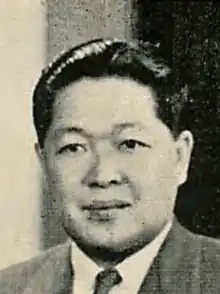Wu Teh Yao 吳德耀 | |
|---|---|
 | |
| Born | 1915 |
| Died | 17 April 1994 (aged 78–79) |
| Occupation | Political scientist |
| Known for | Coauthor of Fenn-Wu Report on education in Malaysia |
Wu Teh Yao (simplified Chinese: 吴德耀; traditional Chinese: 吳德耀; pinyin: Wú Dé Yào, 1915–17 April 1994) was a Chinese political scientist. He was an educator and a specialist in Confucianism and political science.
Education
Wu completed his senior school certificate at the Anglo-Chinese School in Penang at the age of seventeen. He was admitted to the Chung Ling High School, a well-known bilingual school teaching in both Chinese and English, despite not knowing any Chinese, after an interview with the principal David Chen.[1] After his graduation from Chung Ling in 1936, he was admitted to Nanking University (now known as Nanjing University) for a course of Bachelor of Arts under Chen's recommendation.[2] He later obtained a Master of Arts degree from Fletcher School of Law and Diplomacy, Tufts University, and a doctoral degree in political science from Harvard University in 1946.[3]
He was an active athlete during his secondary school years. He represented Malayan Chinese at the National Sports Carnival, Shanghai, China, during the inter-war years.[2]
Career
Academia
Wu joined the United Nations after obtaining his doctorate and participated in the drafting of the Universal Declaration of Human Rights. In 1951, he co-authored the Fenn-Wu Report on the Chinese education system in Malaysia.[2]
He was President of Tunghai University in Taiwan between 1957 and 1971. From then until 1975 he was the head of the Political Science Department, University of Singapore. He was a Professor and the Dean of the College of Graduate Studies of Nanyang University from 1975 to 1980, and was acting vice-chancellor from 1976 to 1977. When Nanyang University and University of Singapore merged in 1980 to form the National University of Singapore, he was appointed Professor of Political Science.[3] He retired in 1981.[2]
Offices
Professor Wu was a founding director of the Institute of East Asian Philosophies, which was established by Goh Keng Swee in 1983 in the interest of studying Confucianism.[3][4][5]
Retirement and death
After his retirement, Professor Wu, a modest person, lived in an HDB apartment in Jurong East, Singapore, and used taxis as his main form of transportation.[6] He died on 17 April 1994 in Taipei, Taiwan, and a memorial service was held for him at the Presbyterian Church in Orchard Road, Singapore.[6] A memorial lecture series was started in his name the following year, with the inaugural lecture delivered by the Confucian scholar Tu Weiming.[7]
References
- ↑ "When words matter". The Straits Times. 21 September 1989. Retrieved 15 October 2017.
- 1 2 3 4 Chung Ling High School Old Boys' (Singapore) Association: 40th Anniversary Souvenir Magazine 1965-2005; p35. 2005.
- 1 2 3 "NUS Libraries: Our Chancellors and Vice Chancellors: A Biographical Sketch". Archived from the original on 22 May 2007. Retrieved 27 January 2007.
- ↑ Wue, Teo Han (20 August 2021). "Remembering Yu Ying-shih in Singapore: An ambitious social experiment disrupted". ThinkChina - Big reads, Opinion & Columns on China. Retrieved 5 January 2022.
- ↑ "NUS: EAI: Institute's Profile and Objectives". Archived from the original on 6 February 2007. Retrieved 28 January 2007.
- 1 2 "NUS Libraries: Our Chancellors and Vice-Chancellors: A Biographical Sketch: Addresses". Archived from the original on 3 January 2006. Retrieved 27 January 2007.
- ↑ "Lecture to honour Confucian scholar". The Straits Times. 16 March 1995.